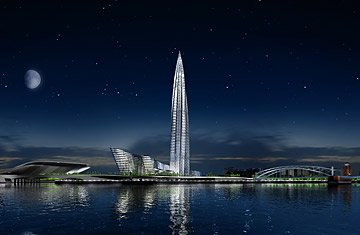
Architect's impression of the approved design for the Okhta tower in St. Petersburg
Imagine if the Empire State Building were to be placed smack in the middle of Venice or Jerusalem. Jutting out from the ancient streets, a skyscraper of that size would seem absurdly out of sync with the iconic beauty of the cities. Developers would likely never get such a proposal approved. But in Russia the rules are different.
Last month, officials in St. Petersburg approved the construction of a 400-m-tall skyscraper in the historic center of the city. The city's beautiful baroque and neoclassical architecture, much of it built in the 18th and 19th centuries when St. Petersburg was Russia's capital, will soon be dwarfed by the Okhta Center, which will house an arm of the state gas monopoly Gazprom.
Observers say such an audacious plan is indicative of Gazprom's political influence, which is unparalleled among Russia's powerful state corporations. Before Vladimir Putin chose Dmitry Medvedev to succeed him as President last year, Medvedev served for six years as chairman of the natural gas monopoly, and thanks to a Putin-backed initiative, the company holds exclusive rights to export the fuel to Europe and beyond. Gazprom raked in about $140 billion in sales last year. It is easily Russia's most lucrative business.
"The decision to build this thing cannot be called corrupt in any regular sense," says Sergei Malkov, a city councilor and one of the three members of the St. Petersburg land-use committee to vote against the plan. (Eleven voted in favor and one abstained.) "Gazprom is not the kind of organization that bribes or corrupts people from the bottom. It pushes through its initiatives from the very top," Malkov tells TIME.
While locals are up in arms about the project, it has also resonated overseas, in part because the historic center of St. Petersburg — once home to Empress Catherine the Great, poet Alexander Pushkin and novelist Fyodor Dostoyevsky — has been listed as a World Heritage Site by UNESCO, the cultural arm of the U.N., since 1990. If the tower is built, the body has said it may revoke the city's status, as its "outstanding universal value" would be under threat.
But even more than the affront to Russian culture, critics point to what they call a breakdown in the rule of law. They see the skyscraper, which would be the tallest in Europe, as a symbol of the Russian leaders' blatant disregard for the public good as they continue to solidify their grip on power. On Sept. 28, a public opinion poll conducted by the EKOM Center, a nongovernmental organization that promotes civil rights in Russia, showed that 66% of St. Petersburg residents oppose the project. A month ago, a packed town-hall meeting ended in acrimony after four hours of heated debate over the tower; security guards confiscated tear gas, knives and brass knuckles from the crowd — a sign that the controversy could even lead to violence. The Okhta Center's official website has also been inundated with virulent postings by residents. The moderator of its comments section was forced to put up an advisory last month, reading: "In making your remarks, please refrain from using overly expressive or offensive language." Since then, the postings have been strangely neutral or positive on the whole.
Valentina Matviyenko, the governor of St. Petersburg and one of Putin's most loyal allies, dismisses accusations of government meddling in the project as "nonsense." "This issue, to put it lightly, has been politicized," she tells TIME. She pointed to other surveys suggesting that "around half" of the city's population supports the Gazprom tower. "We will of course never allow anyone to change the look of historic St. Petersburg. At the same time, we understand that the city has to develop. The city has to follow modern architecture, and every century, every era has its own historical monuments."
Alexander Karpov, director of the EKOM Center, says there is no economic reason for Gazprom to mar the cityscape. It could easily house its offices, he says, in a building that follows the city's rules for architectural preservation. The land-use committee's vote last week, which city councilor Malkov calls a "farce," granted the Okhta Center a unique exemption to these rules, approving a design four times taller than is normally permitted.
"All it comes down to is Gazprom's naked ambition. They just want to be the biggest, the tallest," Karpov says. "But what scares me most about this decision is the clear erosion of the rule of law it demonstrates. This is a precedent, a very loud one, showing that the legal norms are breaking down, that if you have the money and the access, you can do anything you want in this country."
